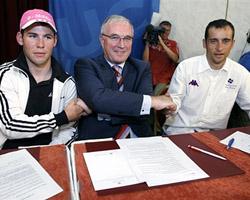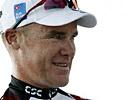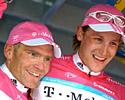News feature: June 21, 2007
CSC and T-Mobile riders in favour of new UCI charter
By Shane Stokes in Giubiasco

|
The coming days will give a clearer indication as to the overall feeling within the peloton about the UCI's new anti-doping charter, but some initial reactions have been received at the Tour de Suisse. Riders from the CSC and T-Mobile teams have already been subject to strict internal controls this year and they have welcomed the latest addition to the anti-doping fight.
"It has to be said that everything being done is in a good direction," said race leader Fränk Schleck at the post-race press conference in Giubiasco yesterday. "CSC has a very, very good anti-doping programme. I think that all that teams will accept this [the new charter]. It is necessary to work for the future. I also think it is a good thing for every team to have a programme like CSC does."
Riders' commitment to a new cycling"I do solemnly declare, to my team, my colleagues, the UCI, the cycling movement and the public that I am not involved in the Puerto affair nor in any other doping case and that I will not commit any infringement to the UCI anti-doping rules. As proof of my commitment, I accept, if it should happen that I violate the rules and am granted a standard sanction of a two-year suspension or more, in the Puerto affair or in any other anti-doping proceedings, to pay the UCI, in addition to the standard sanctions, an amount equal to my annual salary for 2007 as a contribution to the fight against doping. "At the same time, I declare to the Spanish Law, that my DNA is at its disposal, so that it can be compared with the blood samples seized in the Puerto affair. I appeal to the Spanish Law to organize this tests as soon as possible or allow the UCI to organize it." |
His teammate and 2007 Paris-Roubaix winner, Stuart O'Grady, echoed the comments. "I have only seen what has been on the news and it has been mostly in German, so my understanding has been pretty small," he said prior to the start of stage 5. "But everything the UCI does in this area is obviously good for the sport. Whatever new measures they can bring can help. At the end of the day, we have to continue with the anti-doping programmes ... because that is the way of the future.
"I think we have got the strictest, strongest anti-doping programme there is. Obviously, the UCI have come into the game with another fairly similar programme. The main aim is that it is spread amongst the whole peloton and not just one team here, one team there. Everyone has to have the same objective across the board and I think obviously everything the UCI can bring in will be good for the future."

|
Young German Linus Gerdemann gave the new initiative the thumbs up. "I think we are going in the right way. What the cycling world needs is to have more trust. The T-Mobile team will sign it for sure – we are standing for anti-doping and we have no problems with that."
His teammate Roger Hammond feels in a similar way. "I don't think there is anybody in the cycling world who doesn't realise that things have to change. Every step that we take to move towards that change is a good one. I don't think that this will be the end of the saga, by any means, but every step is a step in the right direction.
"We on the team are all pretty happy with it, and Mark [Cavendish] is a pretty good ambassador for the new way for the sport. He is young, he is winning, and for me he is more of a sign than anything else." Hammond added, "Two or three years ago it would have been very difficult for a 22 year-old to come in and to win big races like he has. It just shows that cycling as changed."
Because of their internal controls, which cost the teams hundreds of thousands of euro, the T-Mobile and CSC teams are more closely monitored than the others in the peloton. While other teams are also playing fair, some riders and teams are undoubtedly much more blasé about the need to clean up the sport. The new charter should help to push these in the right direction because race organisers like ASO are likely to insist that only fully-committed riders can take part in their events.

|
This in turn would require the riders to provide DNA samples if requested and to pay a year's salary if they test positive.
Hammond favours the notion of a more level playing field. "If everyone rides clean then of course it is going to be better for us," he stated. "If this stops one more rider from taking that risk and going down that path, then it is already a good thing. There are no negatives from it, really."
Like Gerdemann, he expects the entire T-Mobile squad to opt for the charter. "The whole team will sign... there will be nobody who doesn't. I can't see it anyway. Personally, I don't think it would look very good if riders don't sign it. I think most of the sport will have signed the paper by tonight. We are all for it."
Cyclingnews asked several other riders for their reactions prior to the start of stage five. They said that it was too soon to give an opinion, as they hadn't seen full details of the new initiative. We will bring you more feedback in the days ahead.

